Tesla partners EV stocks in India
| COMPANY | DAY’S CHANGE |
| Sandhar Technologies | 11.54% |
| Sona Comstar | 6.08% |
| Bharat Forge | 3.72% |
Top Electric vehicle parts manufacturing companies in India
Several companies in India are making significant contributions to the electric vehicle (EV) parts manufacturing sector. Here’s a summary of how some of these companies are involved in EV parts manufacturing:
- Bharat Power Solution: Specializes in manufacturing electric vehicle batteries in Uttar Pradesh, India.
- Fiem Industries: Has signed a Memorandum of Understanding (MoU) with Gogoro India to expand its product portfolio in the 2-Wheeler EV segment. The company will manufacture Hub Motor Assembly, Electric Control Unit (ECU), and Motor Control Unit (MCU) for Gogoro.
- Trontek: A Delhi-based electric vehicle battery maker, Trontek currently makes batteries for electric two- and three-wheelers and plans to expand its portfolio to electric four-wheelers in the future.
- Compage Automation: Known for manufacturing electric motors in Haryana, India.
- Karacus Energy: A New Delhi-based lithium-ion battery manufacturer for electric vehicles and solar panels.
- EV Battery Solution: Specializes in lithium batteries for electric vehicles and is based in Bangalore.
- Rizel Automotive: A Chennai-based manufacturer of electric motors.
- Auto Die-Cast (India): Involved in manufacturing the structure and vehicle body for EVs in New Delhi.
- Exicom Power Solution: Based in Gurgaon, Haryana, this company produces Li-ion batteries, charging systems, and battery management systems.
- Elecnovo: Manufactures electric vehicle motors and controllers in Gurgaon, Haryana.
- Electra EV: Based in Coimbatore, Tamil Nadu, Electra EV manufactures a complete powertrain for EVs.
- Napino: Produces EV batteries, motors, chargers, BMS, and other supporting components for electric vehicles.
- Jayem Automotives: Based in Tamil Nadu, India, they produce EV components like BMS, powertrain, battery, motor, and other parts.
- Okaya Battery: A battery manufacturer based in New Delhi.
- Greenfuel Energy: Manufactures electric vehicle batteries and powertrains, including BMS and motors in Haryana.
- GoGoA1: Located in Maharashtra, India, GoGoA1 produces R.T.O. approved EV Conversion kits and EV equipment.
- Amara Raja Batteries LTD: Specializes in manufacturing electric vehicle batteries and is based in Andhra Pradesh.
- Minda Industry: Based in Delhi, Minda Industry manufactures components like lights, switches, sensors, brakes, and other parts for EVs.
These companies are part of a growing ecosystem in India that supports the development and manufacturing of electric vehicles, contributing to the transition towards sustainable transportation solutions.
Credit & Source – KrisDom – Investor
Do you want to hear all about India’s electric vehicles deployment status along with top 25 stocks connected to this emerging billion-dollar industry?
Let us look at the conventional vehicles, we see a fuel tank, engine and transmission system, whereas in the electric vehicles we see a Battery, Motor/generator, and transmission system. Conventional vehicles are usually known as Internal combustion engine ICE vehicles.
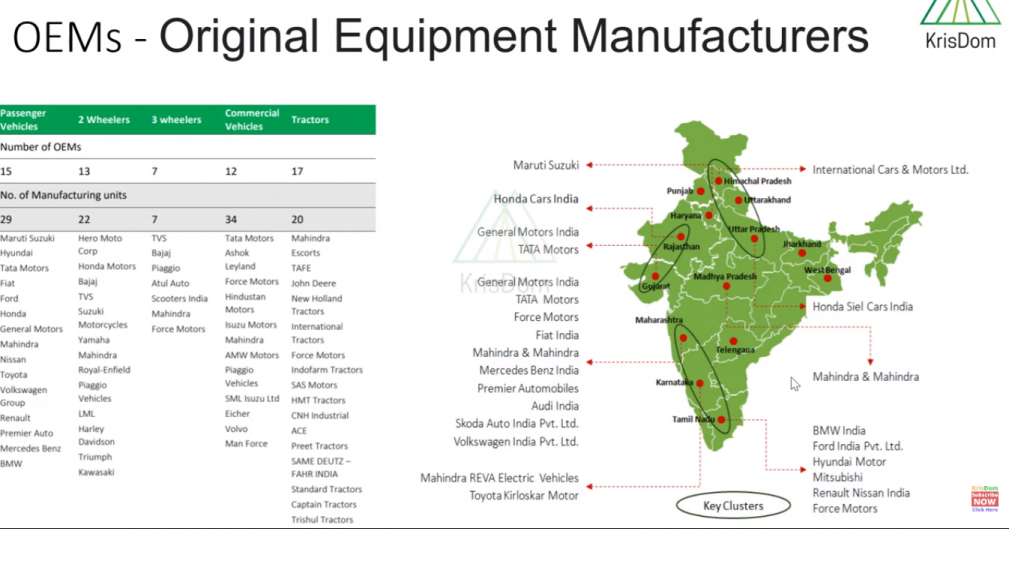
A host of ICE components will be replaced; if we dig deep, significant component differences are shown. Replacement is that Fuel station with charging stations, Fuel tank with battery, an engine with motor, engine control unit with the battery management system, and auxiliary power will hold DC-DC inverter in the electric vehicles.
The percentage of the costs involved is shown here, pause and examine. Auto components will be reduced by 2/3rd, where EV will have just 19 components instead of 30 in the ICE vehicles. EV cars need a significantly high utilisation to break even when we compare with ICE. The area where the savings for opting for EVs is shown in this figure. 180km/day is the number arrived in 2017, and now, it has drastically reduced to 80km/day.
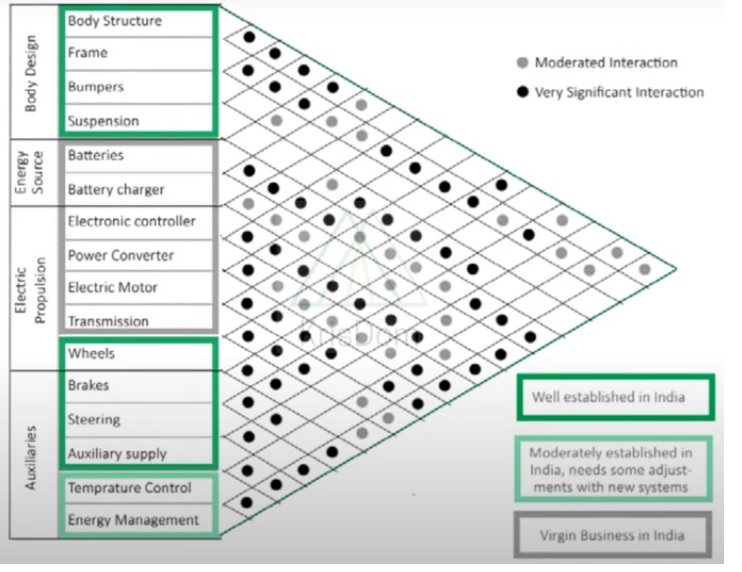
The political structure involved in EV Policy planning and adoption is monitored from Prime Minister’s office, involves NITI AYOG, Ministry of Heavy Industries, Ministry of power, ministry of urban development, ministry of finance, ministry of roads, and department of science and technology.
NITI Aayog drafted a three-phased plan to propel electric and shared mobility. We are currently in the second phase of EV adoption, which involves charging infra development, shortlisting regulatory policies and incentives, etc.
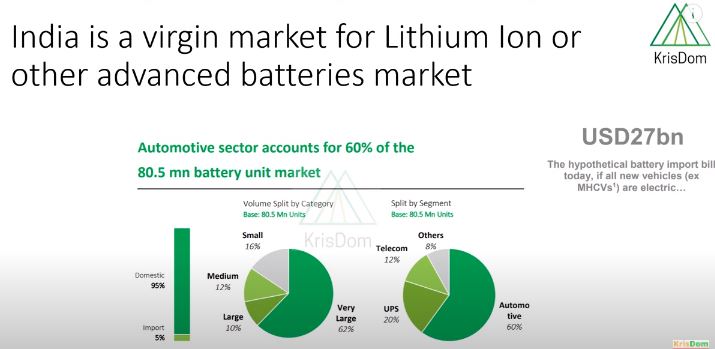
The Indian government took many policy initiatives both on the supply and demand side, cost differential for EVs has drastically reduced. We have seen many EV launches in the recent past, isn’t it?
Many technological advancements can be foreseen in the existing Original Equipment Manufacturers, also known as OEMs in the Indian Auto sector. The industry accounts for 7.1% of the country’s Gross Domestic Product (GDP). There are three key manufacturing clusters in India comprising 15 OEMs in passenger vehicles, 13 in 2 wheelers, 7 in 3 wheelers, 12 in commercial vehicles, and 17 in tractors. All the companies are provided here for your reference. Out of these traditional vehicles, i.e. fuel-based OEMs, At present, there are only three electric car manufacturers, about 10+ players in 2 Wheelers and 3-4 OEM’s in Electric buses. Mahindra Electric is the first major EV manufacturer in India. TATA MOTORS has recently entered the EV market in passenger vehicles and Electric buses, also some news of a potential collaboration with TESLA.
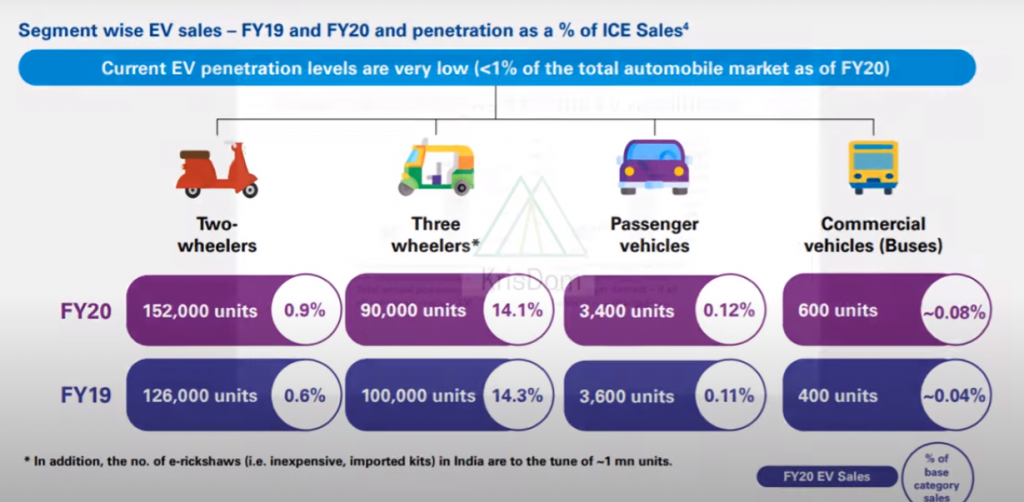
Charging stations involvement is crucial, so power sector stocks which supply power are also part of this EV revolution. We need 20% extra electricity to cater if all vehicles charged at the same time. Figures show annual electric energy and peak power required to charge EVs based on the present state to 7 years ahead.
I have categorized the EV stocks into 5 categories such as stocks related to OEMs, Battery, Battery Management System BMS, Electric Motors, Inverters, other ancillaries, and charging stations.
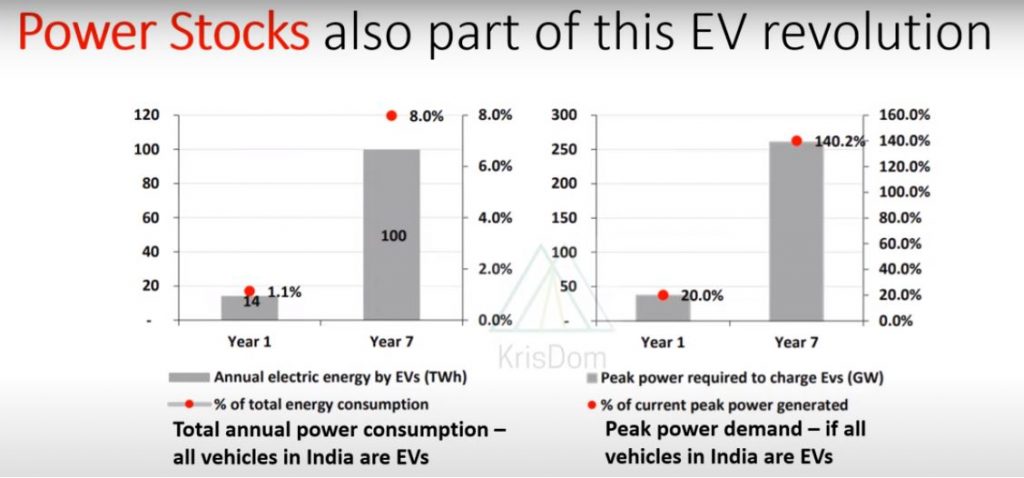
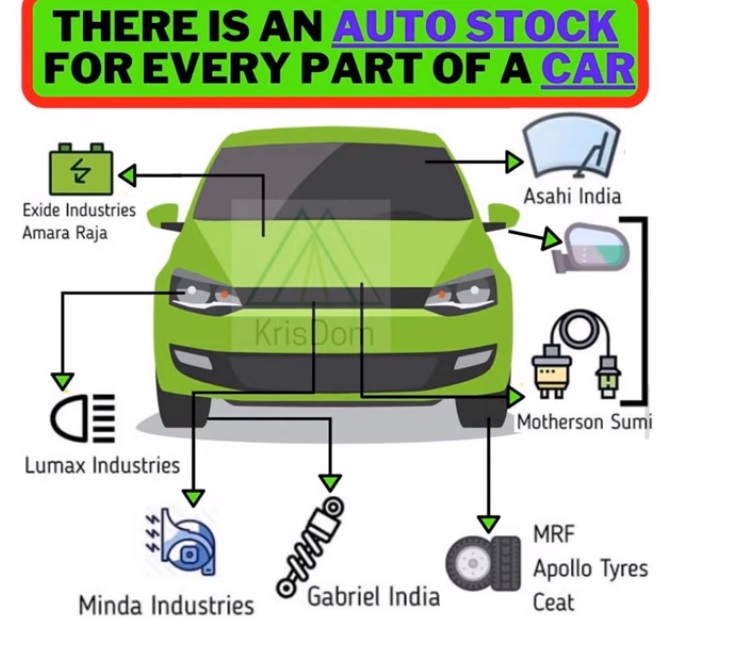
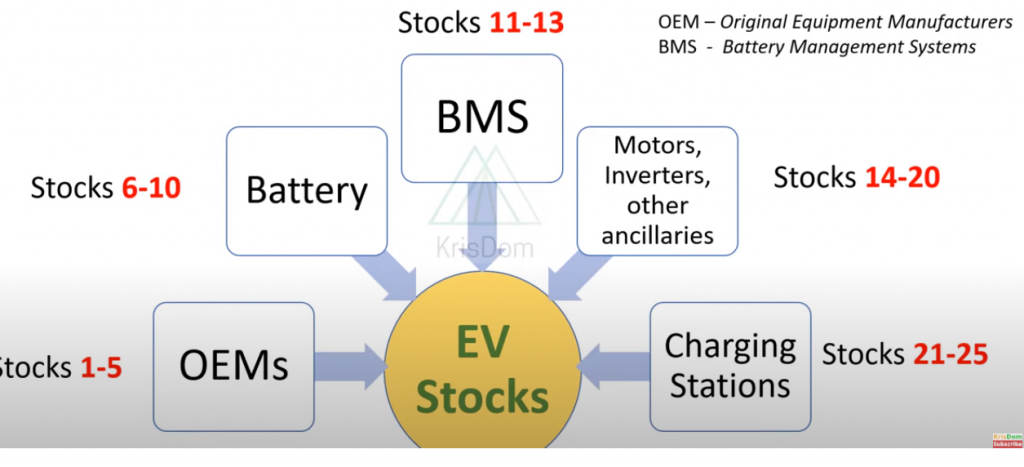
25 stocks are related to each of these categories as shown. I have not considered some of the popular stocks owing to their current valuations, decreasing cash flows and limited price appreciation.
| # | Stock Name | PE | Market Cap | Debt | Promotors Holding |
| 1 | Ashok Leyland | ||||
| 2 | Hero MotoCorp | ||||
| 3 | Mahindra & Mahindra | ||||
| 4 | Olectra Greentech Ltd | ||||
| 5 | Tata Motors | ||||
| 6 | Amara Raja Batteries | ||||
| 7 | Hbl Power Systems | ||||
| 8 | Himadri Special Chemical | ||||
| 9 | Tata Chemicals | ||||
| 10 | Exide Industries | ||||
| 11 | WABCO India | ||||
| 12 | Vakrangee Ltd | ||||
| 13 | Tata Elxsi Ltd | ||||
| 14 | ABB Ltd | ||||
| 15 | Bosch Ltd | ||||
| 16 | Greaves Cotton | ||||
| 17 | Motherson Sumi Systems | ||||
| 18 | Sundaram – Clayton Limited | ||||
| 19 | Varroc Engineering | ||||
| 20 | Endurance Technologies | ||||
| 21 | Indian Oil | ||||
| 22 | NBCC (India) Limited | ||||
| 23 | NTPC Ltd | ||||
| 24 | Urja Global Ltd | ||||
| 25 | Tata Power | ||||
Electric Vehicle Charging Infrastructure Stocks
| #1 | Reliance Industry |
| #2 | Tata Power |
| #3 | Bharat Petroleum |
| #4 | Indian Oil Corporation |
| #5 | ABB India Ltd |
https://www.youtube.com/watch?v=crRfrqmfpgE
Original equipment manufacturer – 5 Company Stocks
Ashok Leyland
Content in Progress
Hero MotoCorp
Content in Progress
Mahindra & Mahindra
Content in Progress
Olectra Greentech Ltd
Content in Progress
Tata Motors
Content in Progress
EV Battery Manufacturing company in india
Amara Raja Batteries
This Hyderabad-based company is a major manufacturer of lead-acid storage batteries for automotive and industrial applications. They offer a wide range of products including automotive batteries, inverter batteries, and industrial batteries, including lithium-ion batteries.
Hbl Power Systems
Headquartered in Hyderabad, HBL manufactures a wide range of batteries, including lead acid, nickel-cadmium, silver zinc, and lithium batteries, and caters to several industries.
Himadri Special Chemical
Himadri Speciality Chemicals will invest ₹4,800 crore over the next 5–6 years in setting up a plant that will produce 2 lakh tonnes of lithium iron phosphate (also known as LFP or lithium ferrophosphate), a key material for making lithium ion batteries used in electric vehicles. This is the first such plant in India.
Tata Chemicals
While Tata Chemicals isn’t directly involved in manufacturing complete EV batteries as of today, January 15, 2024, they are actively involved in the Indian EV battery ecosystem through various initiatives:
Sodium Carbonate Production: Tata Chemicals is a major producer of soda ash, a crucial component in lithium-ion batteries. They are expanding their soda ash production capacity to cater to the growing demand from the EV battery industry.
Lithium-ion Battery Recycling: Tata Chemicals has launched a lithium-ion battery recycling unit to recover valuable metals like lithium, cobalt, nickel, and manganese. This initiative promotes sustainability and reduces reliance on virgin mining for these critical materials.
- Land Acquisition: Tata Chemicals has acquired a 127-acre land parcel in Dholera, Gujarat, earmarked for setting up a future battery manufacturing facility. This facility could house the production of battery actives, cells, and even recycling operations.
- Battery Pack Engineering Centre: In collaboration with Tata Technologies, Tata Chemicals established a Battery Pack Engineering Centre in Pune to develop and design battery packs for various EV applications.
Exide Industries
Based in Kolkata, Exide is a well-known multinational company specializing in life insurance and storage batteries. It’s one of the largest lead-acid battery manufacturers globally and has a significant presence in India.
Okaya Power Pvt. Ltd.:
Established in 1987, Okaya is known for manufacturing batteries for automotive, industrial, and consumer applications. They also focus on developing green energy solutions and energy storage systems.
Panasonic India Private Limited
A subsidiary of Panasonic Corporation, this company is a key player in the EV battery industry in India. They’ve been pioneers in introducing lithium-ion battery technology in the country.
Luminous Power Technologies Private Limited
Based in India, Luminous manufactures a variety of power backup and solar solutions including various types of batteries like lead-acid, tubular, lithium-ion, and solar batteries.
Tata AutoComp GY Batteries Private Limited
A joint venture between Tata AutoComp Systems and GS Yuasa International, Japan, Tata AutoComp GY Batteries manufactures a diverse range of automotive and inverter batteries for various
EV Battery Management Systems (BMS) company in india
When it comes to EV Battery Management Systems (BMS) in India, there are several notable companies making waves in the industry. Here are a few of the frontrunners:
The EV sector in India is growing rapidly, but the BMS sub-segment remains dominated by private companies or subsidiaries of established firms. While several players have significant potential, they haven’t yet entered the public market.
Prominent BMS Companies with IPO Potential:
- ION Energy: This global leader in battery management and intelligence boasts innovative technologies and diverse applications. Their strong track record and potential for future growth make them a promising contender for an IPO.
- Battrixx: Backed by the giants Tata AutoComp Group and Bosch, Battrixx possesses a strong foundation and expertise in cutting-edge BMS solutions. Their association with established players increases their potential for future public listing.
- SUN Mobility: With their unique battery swapping model and advanced BMS technology, SUN Mobility has carved a niche in the Indian EV market. Their focus on the rapidly growing two-wheeler segment makes them an interesting potential future investment option.
WABCO India
Content in Progress
Vakrangee Ltd
Content in Progress
Tata Elxsi Ltd
Here are some noteworthy BMS companies with potential for future IPOs:
Content in Progress
Motors, Interveres, Other Ancillaries – 10 Company Stocks
ABB Ltd
Content in Progress
Bosch Ltd
Content in Progress
Greaves Cotton
Content in Progress
Motherson Sumi Systems
Content in Progress
Sundaram – Clayton Limited
Content in Progress
Varroc Engineering
Content in Progress
Endurance Technologies
Content in Progress
EV Charging Station company in india
As of today, October 26, 2023, there are no dedicated EV Charging Station companies listed on any of the major Indian stock exchanges. The EV charging infrastructure sector in India is still in its early stages of growth, with most players being privately owned or subsidiaries of larger corporations.
However, several promising companies have the potential to consider an IPO in the future. Here are some noteworthy players to watch:
Companies with IPO Potential:
- Tata Power EZ Charge: Backed by a leading energy conglomerate, Tata Power EZ Charge boasts the largest network of charging stations in India. Their established presence and ambitious growth plans make them a promising contender for an IPO.
- Charge Zone: Known for their quality and high-speed chargers, Charge Zone is rapidly expanding its network. Their strong brand and focus on premium charging solutions could attract investor interest in the future.
- Statiq: Operating an extensive network across South India, Statiq is another potential candidate for an IPO. Their rapid growth and focus on affordability could resonate with investors seeking exposure to the EV charging market.
Here are some notable EV Charging Station companies in India, categorized by their focus and reach:
Large-scale network operators:
- Tata Power EZ Charge: One of the largest networks, offering AC and DC charging stations across major cities.
- Charge Zone: Known for high-quality stations and fastest charging points, operating in 25+ cities.
- Ather Grid: Focuses on DC fast charging stations for two-wheelers, present in 56 cities.
- Statiq: Boasting a network of over 6000+ AC and DC stations, mainly concentrated in South India.
- Fortum India: Offers AC and DC charging solutions, with a presence in major cities.
Emerging players:
- Accel EV: Established in Bangalore, provides charging solutions for public and private spaces.
- Ecodrive: Specializes in setting up charging stations in residential communities and offices.
- Pluggo: Offers app-based charging solutions with a focus on home and commercial installations.
- Magenta Power: Provides solar-powered EV charging stations, promoting sustainable charging options.
- Yulu: Primarily focused on electric scooter charging, offering swappable batteries in select cities.
Other noteworthy companies:
- Charzer: Offers affordable and portable AC chargers ideal for small businesses and restaurants.
- Myson EV: Focuses on charging infrastructure for two-wheelers and three-wheelers.
- Sun Mobility: Operates a battery swapping model for electric two-wheelers, with charging stations in key locations.
Indian Oil
Content in Progress
NBCC (India) Limited
Content in Progress
NTPC Ltd
Content in Progress
Urja Global Ltd
Content in Progress
Tata Power
Content in Progress